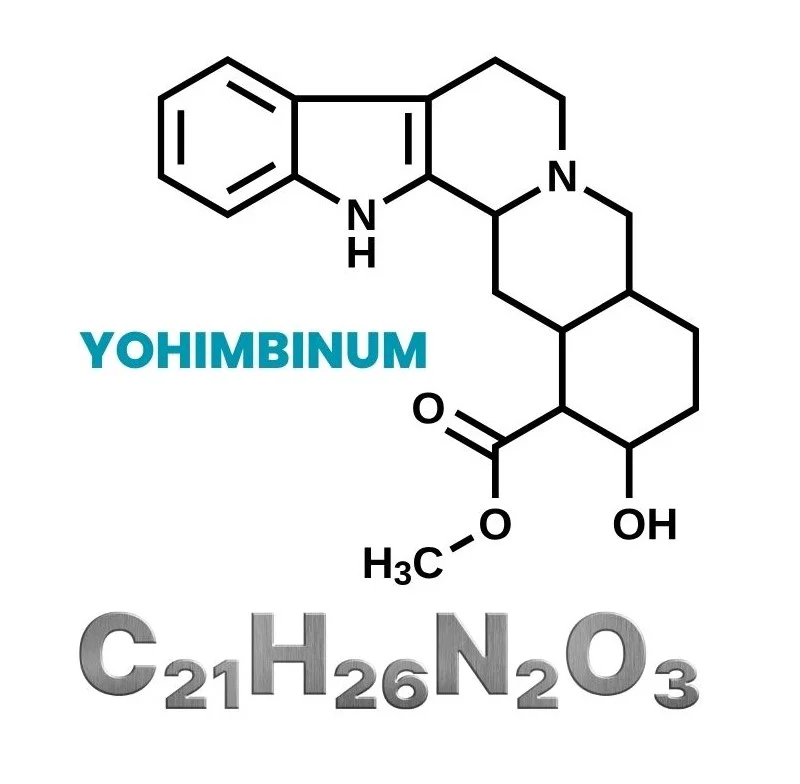Yohimbinum is a homeopathic remedy derived from the bark of the Coryanthe Yohimbe tree, scientifically known as Pausinystalia johimbe.
It is primarily used as an aphrodisiac and sexual stimulant in physiological doses.
In homeopathy, it is indicated for various sexual and congestive conditions, including impotence, bleeding piles, and menorrhagia.

Table of Contents
ToggleSOURCE INFORMATION
- Yohimbine is an alkaloid derived from the bark of the Coryanthe Yohimbe tree, scientifically known as Pausinystalia johimbe.
- The Yohimbe tree is native to western Africa, particularly in regions such as Nigeria, Cameroon, Gabon, and Congo.
- The extraction process involves harvesting the bark of the Yohimbe tree, which contains yohimbine as its primary active compound.
- The bark is then dried and ground into a fine powder, followed by extraction using various solvents such as alcohol or water.
- Yohimbine hydrochloride is the most commonly used form of yohimbine in medicine.
- It is a prescription medication approved by regulatory authorities in some countries for the treatment of erectile dysfunction and other sexual disorders.
- Yohimbine works primarily by blocking alpha-2 adrenergic receptors, which leads to increased blood flow to the genital area and improved erectile function.
- It also enhances the release of neurotransmitters such as norepinephrine and dopamine, which play a role in sexual arousal and desire.
- In addition to its use in traditional medicine as an aphrodisiac and sexual stimulant, yohimbine has also been studied for its potential therapeutic effects in other conditions such as anxiety, depression, and obesity.
- However, further research is needed to fully understand its efficacy and safety in these areas.
DRUG PATHOGENESIS
- Yohimbinum acts primarily on the central nervous system and sexual organs.
- It stimulates sexual function and can lead to strong and lasting erections.
- Additionally, it may cause agitation, metallic taste, copious salivation, and nausea.
- It can also induce fever with intense heat, waves of heat and chilliness, and a tendency to sweat.
KEY CHARACTERISTICS
- Aphrodisiac and sexual stimulant.
- Indicated for congestive conditions of the sexual organs.
- Causes hyperemia of the milk glands and stimulates lactation.
- May lead to strong and lasting erections.
- Can induce sleeplessness with thoughts of past events.
PARTICULAR ORGAN SYMPTOMS
Head
- Agitation with sensations of heat in the face.
- Unpleasant metallic taste in the mouth.
- Excessive salivation.
- Nausea and belching.
Sexual
- Strong and prolonged erections.
- Impotence associated with neurasthenia (Relating to a condition characterized by fatigue, weakness, and sometimes nervousness).
- Bleeding piles (hemorrhoids).
- Intestinal hemorrhages.
- Urethritis (inflammation of the urethra).
Fever
- Chills followed by intense heat.
- Alternating waves of heat and cold.
- Tendency to sweat profusely.
Sleep
- Difficulty falling asleep.
- Persistent thoughts about past events keeping the individual awake.
DOSE
- Yohimbinum should be used cautiously and preferably under the guidance of a healthcare professional.
- As a sexual stimulant, a physiological dose of ten drops of a one percent solution or hypodermic tablets of 0.005 grams can be used.
- In homeopathy, the recommended dose is the third potency.
Frequently Asked Questions
What conditions is Yohimbinum indicated for?
- Yohimbinum is indicated for sexual and congestive conditions, including impotence, bleeding piles, and menorrhagia.
How does Yohimbinum work as an aphrodisiac?
- Yohimbinum stimulates sexual function by acting on the central nervous system and sexual organs, leading to strong and lasting erections.
Is Yohimbinum safe to use?
- Yohimbinum should be used cautiously and preferably under the guidance of a healthcare professional, especially in cases of acute and chronic inflammations of abdominal organs.
Can Yohimbinum be used alongside conventional medication?
- It is advisable to consult a healthcare professional before using Yohimbinum alongside conventional medication to avoid potential interactions or adverse effects.
